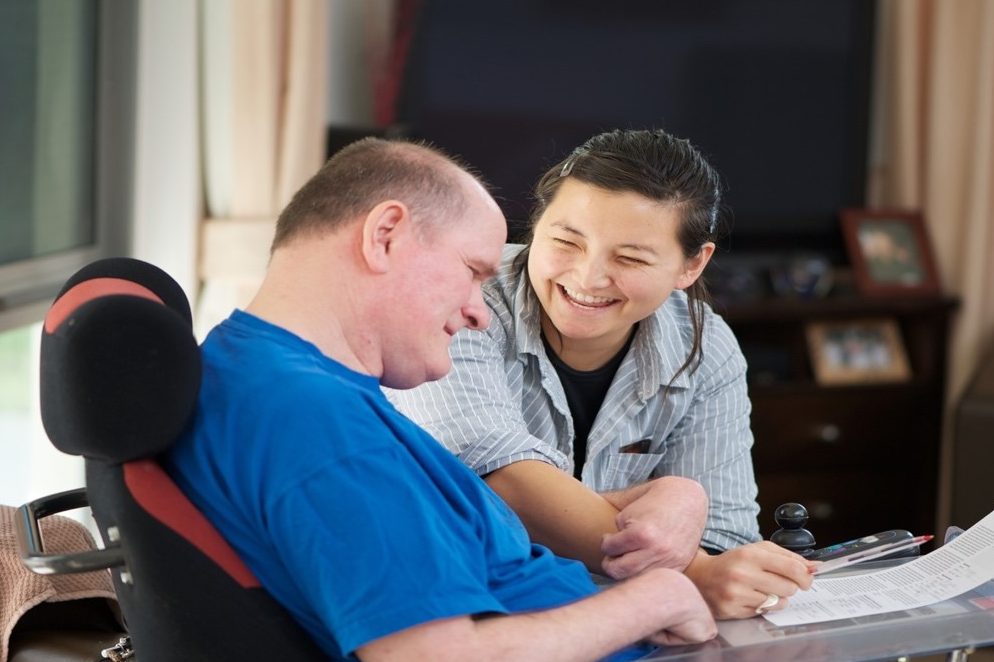This study started in September 2020.
Researchers ask people questions to find out new information.
There are other studies about coronavirus (Covid-19). These studies are hard for people with a learning disability to take part in.
The voices of people with learning disabilities were not being heard.
Researchers (including Dr Jill Bradshaw and Dr Nick Gore of the Tizard Centre) did this study to hear from people with learning disabilities themselves.
The report is very important because so many people with learning disabilities took part and told their own stories.
621 adults with learning disabilities told the researchers about their lives during COVID-19.
Some adults with learning disabilities were not able to talk to researchers.
The researchers also asked 378 family carers or paid support staff questions about the lives of these people with learning disabilities.
The researchers talked to people in England, Northern Ireland, Scotland and Wales.
They talked to people with learning disabilities to check what questions to ask.
They asked questions that were important to people with learning disabilities and their families.
This is what the researchers have found out.
Around 8%-10% of people with learning disabilities thought they had caught Covid-19.
Some of them went to hospital.
People with learning disabilities told us they knew people who had died from Covid-19.
Just over 10% of people with learning disabilities said someone close to them had died due to Covid-19.
People with learning disabilities are getting less help with their health.
Less than half of people with learning disabilities have seen their doctor since lockdown started.
Community activities have stopped.
Day centres have closed.
Lots of people with learning disabilities have been lonely.
They are lonely because lockdown stopped their friends and family visiting.
Many people with learning disabilities are worried about getting Covid-19.
Many people with learning disabilities are more worried about their friends and family getting Covid-19.
This press release has been written in Easy Read style. Easy Read is a way of making information more accessible to people with learning disabilities.
Dr Bradshaw and Dr Gore said: ‘This is an important study. We now know that people with learning disabilities are at greater risk from Covid-19. Since the first lockdown, around a third of family carers/paid support staff told us that the person with learning disabilities’ health had changed for the worst. People with learning disabilities struggled to get access to essential equipment. People with more severe or profound learning disabilities have had overwhelmingly negative experiences during the pandemic. There was a substantial reduction in the amount of support people received. Family carers reported feeling stressed, tired and having difficulties sleeping.
‘We are working with groups of family carers and people with learning disabilities to make sure we are asking the right questions in the right way. We are about to start wave 2 of the research, where we will ask people about their experiences so we can find out whether anything has changed.’
The full research report titled ‘Coronavirus and People with Learning Disabilities Study Wave 1 Results: March 2021 (Full Report)’, is available on the University of Warwick’s website.
Principal Investigators and Co-investigators: Professor Chris Hatton (Manchester Metropolitan University); Professor Richard Hastings (University of Warwick); Professor David Abbott (University of Bristol); Dr Stephen Beyer (Cardiff University); Dr Jill Bradshaw (University of Kent); Dr Nick Gore (University of Kent); Professor Pauline Heslop (University of Bristol); Professor Andrew Jahoda (University of Glasgow); Anna Marriott (National Development Team for Inclusion); Dr Katrina Scior (UCL); Dr Laurence Taggart (University of Ulster); Dr Stuart Todd (University of South Wales)

